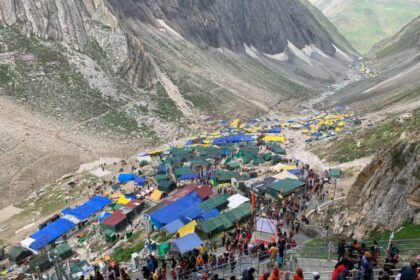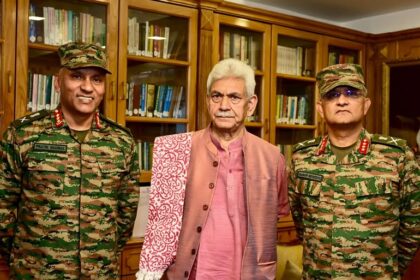Omar Abdullah Rejects “Cheap Politics” Over Pahalgam Attack, Calls for United Front Against Terrorism
||Black and White Digital News ||
||Parvinder Singh April 28,2025 ||
Jammu: In an emotionally charged yet politically mature address to the Jammu and Kashmir Assembly today, Chief Minister Omar Abdullah categorically ruled out using the tragic Pahalgam terror attack as a bargaining chip to demand statehood restoration. His speech, delivered amid heightened tensions in the Union Territory, emphasized national unity, constitutional realities, and an unwavering stand against terrorism emanating from across the border.
“I am not going to ask for statehood today. My politics is not so cheap that I will use the Pahalgam incident as emotional blackmail to ask the Centre to restore statehood,” Abdullah said, asserting a firm political posture that drew strong reactions across party lines.
Pahalgam Terror Attack:
The backdrop of Abdullah’s remarks is the horrifying terror strike in Pahalgam earlier this week, where heavily armed militants ambushed civilians resulting in multiple fatalities and injuries. The attack, believed to have been orchestrated by Pakistan-backed terror outfits, has reignited concerns over cross-border terrorism and the security situation in Kashmir.
Initial investigations suggest a resurgence of well-organized terror networks, prompting calls for tighter security measures and a unified political response.
Political Dynamics: A Shift in Tone
Omar Abdullah’s speech marks a significant shift in the usually charged political discourse of Jammu and Kashmir, where tragic incidents have historically been followed by emotional appeals for constitutional and political changes. By refusing to politicize the tragedy, Abdullah positioned himself as a statesman prioritizing national interest over immediate political gains.
His acknowledgment of the Centre’s authority over Jammu and Kashmir — due to its Union Territory status — reflects a pragmatic approach:
“Since Jammu and Kashmir is a Union Territory, the Home Department is directly under the Union Ministry of Home Affairs. It is their responsibility,” he noted.
This statement also subtly underlines the limitations regional leaders currently face in influencing security policy — a reality many in Jammu and Kashmir grapple with after the abrogation of Article 370 in 2019 and the bifurcation of the state into two Union Territories.
Public Sentiment and Reaction
Among the general public, Abdullah’s mature stance has found both praise and skepticism. Many appreciate the focus on unity and the need to fight terrorism collectively without muddying the waters with political demands. Others, especially within opposition parties and civil society groups advocating for statehood, feel that moments like these must be used to remind the Centre of its unfulfilled promises.
Social media saw hashtags like #UnitedAgainstTerror and #KashmirStrong trending, reflecting widespread public condemnation of the attack and support for a united stand against terrorism.
Future Implications: Politics of Responsibility
Omar Abdullah’s approach today could have long-term implications for Kashmir’s politics. By choosing not to demand statehood at this juncture, he has signaled a politics of patience and responsibility, potentially strengthening his and the National Conference’s image as mature stakeholders.
However, the demand for full statehood — restoration of Jammu and Kashmir’s erstwhile status — remains alive and is expected to resurface in calmer times.
The Centre, for its part, may view Abdullah’s stand as a positive development, possibly opening doors for more structured dialogue in the future regarding political and administrative reforms in the UT.
A Lesson in Political Maturity:
In a region where emotional politics often dominates discourse, Omar Abdullah’s speech stands out for its measured tone and responsible messaging. By condemning terrorism unequivocally, recognizing the constitutional reality, and refusing to manipulate public emotion, he has reinforced the need for politics that prioritizes peace, dignity, and collective security over populism.
His stance could serve as a model for political conduct not just in Jammu and Kashmir but in conflict-affected areas across the country.
Key Takeaways:
• Omar Abdullah refused to use the Pahalgam attack as a pretext to demand statehood restoration.
• Acknowledged that Jammu and Kashmir, as a UT, is under the direct control of the Centre’s Home Ministry.
• Condemned Pakistan-backed terrorism and called for unity to defeat terror networks.
• Demonstrated a politics of maturity, focusing on long-term stability rather than short-term political mileage.
• Set a tone for responsible leadership amidst crisis.









